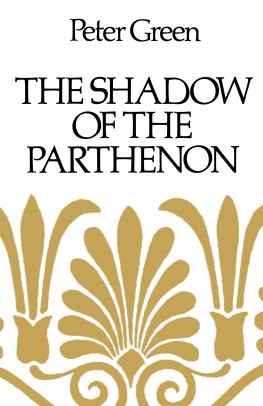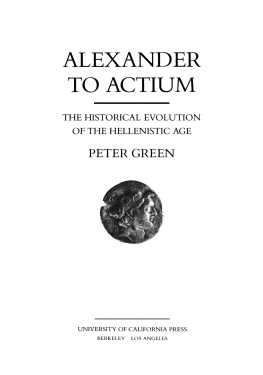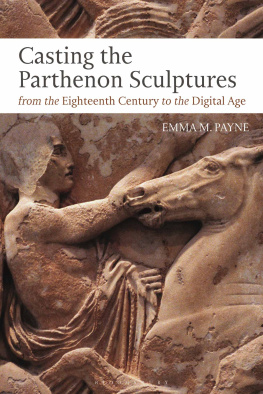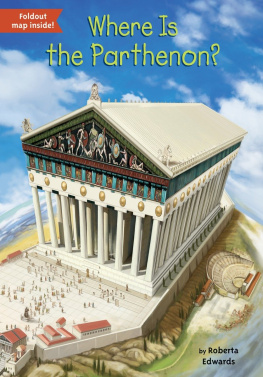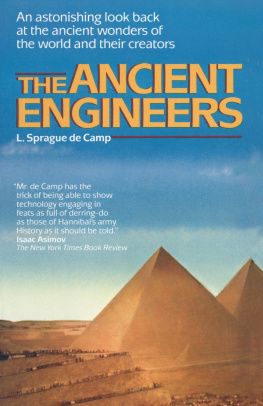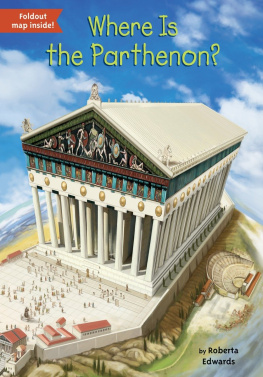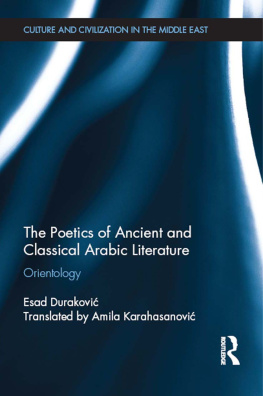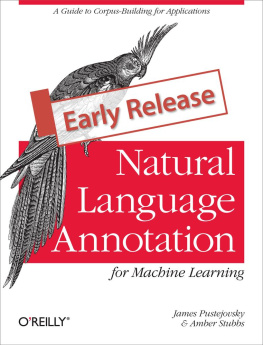Green - The shadow of the Parthenon: studies in ancient history and literature
Here you can read online Green - The shadow of the Parthenon: studies in ancient history and literature full text of the book (entire story) in english for free. Download pdf and epub, get meaning, cover and reviews about this ebook. City: Berkeley;Greece, year: 2010;2014, publisher: University of California Press, genre: Art. Description of the work, (preface) as well as reviews are available. Best literature library LitArk.com created for fans of good reading and offers a wide selection of genres:
Romance novel
Science fiction
Adventure
Detective
Science
History
Home and family
Prose
Art
Politics
Computer
Non-fiction
Religion
Business
Children
Humor
Choose a favorite category and find really read worthwhile books. Enjoy immersion in the world of imagination, feel the emotions of the characters or learn something new for yourself, make an fascinating discovery.
The shadow of the Parthenon: studies in ancient history and literature: summary, description and annotation
We offer to read an annotation, description, summary or preface (depends on what the author of the book "The shadow of the Parthenon: studies in ancient history and literature" wrote himself). If you haven't found the necessary information about the book — write in the comments, we will try to find it.
Green: author's other books
Who wrote The shadow of the Parthenon: studies in ancient history and literature? Find out the surname, the name of the author of the book and a list of all author's works by series.
The shadow of the Parthenon: studies in ancient history and literature — read online for free the complete book (whole text) full work
Below is the text of the book, divided by pages. System saving the place of the last page read, allows you to conveniently read the book "The shadow of the Parthenon: studies in ancient history and literature" online for free, without having to search again every time where you left off. Put a bookmark, and you can go to the page where you finished reading at any time.
Font size:
Interval:
Bookmark:

BY THE SAME AUTHOR
Fiction
ACHILLES HIS ARMOUR
THE SWORD OF PLEASURE
THE LAUGHTER OF APHRODITE
HABEAS CORPUS
CAT IN GLOVES
Travel and Biography
THE EXPANDING EYE
KENNETH GRAHAME : A STUDY OF HIS LIFE, WORK, AND TIMES
SIR THOMAS BROWNE
JOHN SKELTON
Classical History and Literature
ESSAYS IN ANTIQUITY
JUVENAL I THE SIXTEEN SATIRES
ARMADA FROM ATHENS: THE FAILURE OF THE SICILIAN EXPEDITION, 415413 B C
THE YEAR OF SALAMIS : 480479 B C
ALEXANDER THE GREAT : A HISTORICAL BIOGRAPHY
PARTHENON
AND LITERATURE
UNIVERSITY OF CALIFORNIA PRESS
BERKELEY AND LOS ANGELES
1972
University of California Press
Berkeley and Los Angeles, California
Copyright Peter Green 1972
ISBN 978-0-520-25507-4
e-ISBN 978-0-520-93471-9
Library of Congress Catalog Card Number 72-87205
for Alan and Julie Boegehold
with love, as always
This book forms a companion volume to Essays in Antiquity(1960); since the latter work is not only still in print, but depressinglyoftenfrom my point of viewthe one book I havewritten which people know and remember, there may be roomfor a further venture in the same field. As before, with one ortwo exceptions, none of the studies here presented has previouslyappeared in anything like its present form; and even the exceptionshave undergone very substantial revision. The Shadow ofthe Parthenon appears here for the first time; and the bulk ofits companion-pieces have been so drastically rewritten,recombined and expanded that they, too, can virtually count asnew creations. Material has gone into them from a number ofwidely disparate sources: I have in fact printed no more thanabout one-tenth of the material at my disposal, preferring toregard a book of this sort as a critical selection and reappraisalof my views over a twelve-year period rather than an untidyholdall for the dusty contents of my bottom drawer.
Lectures, seminar-notes, and reviews or articles which firstappeared in The Times Literary Supplement account for a goodproportion of the raw material fed into my files for reworkingand revision. The section on Sappho in The Individual Voicebegan life as a postscript to my novel The Laughter of Aphrodite,was subsequently revised and expanded for publication in theCornhill Magazine and Horizon (U S A) and acquired furtheradditions and modifications from several years lecturing onGreek history and literature. The First Sicilian Slave War wasoriginally published (with full documentation) in Past and Present20 (Nov. 1961), pp. 1029. Juvenal and his Age is reprinted,with various additions, deletions, and modifications, from theIntroduction to my translation of Juvenal for the PenguinClassics. My Appendix on The Date of Archilochus appearshere in print for the first time.
Reading over all this material suggests to me that my views onancient history, and classical literature, and the academic worldin general, may have become a little less rebarbative (but not, Ihope, boringly so) with the onset of middle age. When I wroteEssays in Antiquity I was a freelance maverick flaying theprofessors; now the whirligig of time brings in its revenges, andI write (though still not quite adjusted to the condition) as aprofessor myself. I take comfort, however, from the followingpassage in Anatole France s LIle des Pingouins, originally broughtto my notice by a correspondent (whether in a spirit of criticismor encouragement I have never quite decided). This, I feel, mayappositely stand as an epigraph, not so much to the presentbookwhere it might be taken as implying qualities to whichI myself am far from laying claimbut rather to the whole fieldof historical studies, modern no less than ancient:
I would like to think that the situation today is not quite soblack as Anatole France painted itthough uneasily consciousof my own kinship, in too many respects, with that hypotheticalconformist whom he portrays, mon semblable, mon frre. But ifI have managed, in the course of these pages, to displace, withlegitimate arguments, even one hallowed but erroneous idereue, I shall not feel my time has been spent altogether in vain.
My sincere thanks go to Messrs T. C. W. Stinton and W. G. Forrest ,whose searching criticisms, published in Past and Present22 (July 1962) pp. 8792, led me at several important pointsto modify my conclusions on the First Sicilian Slave War. MrForrest has since, all unwittingly, put me still further in his debtwith the publication of that brilliant, witty, stimulating andsplendidly heterodox book The Emergence of Greek Democracy,a dog-eared copy of which has accompanied me through all myGreek travels, and must, inevitably, have left its mark on someof the views propounded here: though to say that its authorshould not be held responsible for these is no mere emptydisclaimer. I am also grateful to my colleagues on the Faculty ofCollege Year in Athens, especially Professor H. D. F. Kitto andMr A. R. Burn , for many stimulating discussions, and muchperceptive criticism of ideas developed in the course of this book.Lastly I would like to name, honoris causa, several Cambridgescholars whose wise teaching and counsel put me immeasurablyin their debt as an undergraduate, and whose friendship hasmeant much to me since: Mr G. T. Griffith, Professor W. K. C.Guthrie, Professor G. S. Kirk , Mr S. J. Papastavrou, andMr F. H. Sandbach. Like all students of ancient history, I alsoowe a great debt to Professor M. I. Finley.
For permission to reprint material here included my gratefulthanks go to the following: Mr Arthur Crook, Editor of TheTimes Literary Supplement, and Times Newspapers Ltd., for partsof The Shadow of the Parthenon, Clio Reviewed, Athensand Jerusalem, Myths and Symbols, The Individual Voice,and Juvenal and his Age; the Editors of Horizon and TheCornhill Magazine for part of The Individual Voice; the Editorof Past and Present for The First Sicilian Slave War; the Editorsof Penguin Classics and Penguin Books Ltd., for the greaterpart of Juvenal and his Age; Mr Guy Davenport, and theUniversity of California Press, for the translation of Archilochusquoted on pp. 16465, which appears as no. 262 in his bookCarmina Archilochi: The Fragments of Archilochos. All othertranslations are my own: those of Sappho were originally madefor Horizon.
PETER GREEN
Department of Classics
The University of Texas at Austin
October 1971
ONE GUSTY March afternoon, a few years ago, I found myselftrudging up the approaches to the Acropolis in the companyof a well-known British novelist whose habits were moreconvivial (to say the least of it) than one could ever have guessedfrom his published work. After an excellent and discursive lunchin the old quarter known as the Plaka, I asked him what hewould like to do next. See the bloody Parthenon , I suppose,he said. His voice was an interesting blend of helplessness andsuppressed resentment. So we plodded our way to the summitof that vast outcrop, eyes half-closed against the stinging,dust-laden wind, passed through the Propylaea , and began pickingour way across a wilderness of jumbled marble blocks towardsthe huge and too-familiar temple, outlined now against a skyof grey scudding clouds. The air was mournful, oppressive;occasional rain-drops plopped heavily groundwards. It was allvery different from the travel posters.
Font size:
Interval:
Bookmark:
Similar books «The shadow of the Parthenon: studies in ancient history and literature»
Look at similar books to The shadow of the Parthenon: studies in ancient history and literature. We have selected literature similar in name and meaning in the hope of providing readers with more options to find new, interesting, not yet read works.
Discussion, reviews of the book The shadow of the Parthenon: studies in ancient history and literature and just readers' own opinions. Leave your comments, write what you think about the work, its meaning or the main characters. Specify what exactly you liked and what you didn't like, and why you think so.

